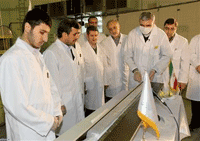
UN inspectors to press Iran on site access
Vienna, May 14, 2012
A senior UN nuclear official said Iran must give his inspectors access to information, people and sites as he began a two-day meeting with Iranian officials on the Islamic state's disputed atomic activities on Monday.
The meeting in Vienna will test Iran's readiness to address UN inspectors' suspicions of military dimensions to its nuclear programme, ahead of high-stakes talks on the programme in Baghdad next week between Iran and six world powers.
Two meetings in Tehran this year with UN inspectors failed to make any notable progress, especially on the inspectors' request for access to Parchin, a military site where the watchdog believes nuclear weapons-relevant research may have taken place.
"The aim of our two days (of talks) is to reach agreement on an approach to resolve all outstanding issues with Iran," Herman Nackaerts, deputy director general of the International Atomic Energy Agency, told reporters as he arrived at an Iranian diplomatic mission in a smart area of Vienna.
"In particular, clarification of the possible military dimensions remains our priority... It is important now that we can engage on the substance of these issues and that Iran let us have access to people, documents, information and sites."
Western diplomats will be watching the discussions for any sign that Iran is now ready to make concrete concessions, saying this would send a positive message ahead of the Baghdad talks.
Iran and the powers involved in nuclear diplomacy - the United States, Russia, China, Britain, France and Germany - revived negotiations in Istanbul last month after a 15-month hiatus and both sides say they hope for progress in Baghdad.
The resumption of diplomacy offers a chance to defuse tension that has raised fear of a new Middle East war.
The West suspects Iran is seeking to develop the capability to make nuclear bombs although intelligence officials believe Tehran has not made a decision whether to actually build them.
The Islamic Republic, one of the world's largest oil producers, says its atomic programme is a peaceful push to generate more electricity for a rapidly growing population.
Israel - widely believed to hold the Middle East's only nuclear arsenal - and the United States have not ruled out military action to prevent Iran from obtaining atomic bombs if negotiations fail to achieve this peacefully.
The IAEA wants Iranian officials to address Western intelligence reports pointing to past and possibly current research activity relevant to developing the means and technologies to build nuclear weapons. An IAEA report in November lent independent weight to the allegations and helped pave the ground for a sharp escalation of US and European sanctions to block Iran's oil exports.
The report found that Iran in 2000 built a large containment chamber at Parchin - a military complex southeast of Tehran - in which to conduct high-explosive tests that the IAEA said were "strong indicators of possible (nuclear) weapon development".
Iran says the accusations are fabricated but has not granted repeated requests by the UN agency to visit Parchin. IAEA head Yukiya Amano says the issue is a priority in this week's talks.
Western diplomats say they suspect Iran may be cleaning the site to remove incriminating evidence before inspectors can go there. A US security institute said last week that satellite imagery showed activity at Parchin, which it said raised concern that Iran may be "washing" the building the IAEA wants to see.
Iran's ambassador to the IAEA has previously dismissed such suspicions about Parchin as "childish" and "ridiculous".
Iran has suggested that a broader agreement with the IAEA - which regularly monitors Iran's declared nuclear sites - on how to address the agency's outstanding questions must be reached before it would consider letting inspectors into Parchin.
Western diplomats see this as a stalling tactic and do not expect Iran suddenly to allow access to Parchin.
"I would be very surprised," one diplomat said, suggesting that the Islamic Republic would want to extract the maximum diplomatic benefit from any such concession.
At the Baghdad talks, the big powers will press for concrete confidence-building steps by Iran.
A Western priority is for Iran to halt the higher-grade uranium enrichment work it started two years ago and has since expanded, potentially shortening the time needed to build a bomb.
Iran wants the meeting to yield a deal on an easing of sanctions, something the West will be reluctant to consider before seeing substantive concessions. - Reuters







